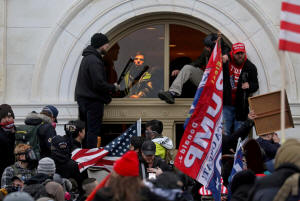U.S. House Jan. 6 Capitol riot probe to consider Trump criminal referral
 Send a link to a friend
Send a link to a friend
 [December 19, 2022]
By Patricia Zengerle [December 19, 2022]
By Patricia Zengerle
WASHINGTON (Reuters) - The U.S. House of Representatives committee
probing the Jan. 6, 2021, assault on the Capitol by Donald Trump
supporters moves to wrap up its work this week with what could be as
many as three criminal referrals against the former president.
The Democratic-led panel has spent 18 months probing the unprecedented
attempt to prevent the peaceful transfer of power by thousands of
backers of the Republican president, inspired by Trump's false claims
that his 2020 election loss to Democratic President Joe Biden was the
result of widespread fraud.
Possible criminal referrals to the Justice Department could be on
charges including obstruction of an official proceeding of Congress,
conspiracy to defraud the United States, and insurrection, according to
multiple media reports.
The Guardian and Politico first reported the possible charges, citing
unidentified sources.

The committee is scheduled to meet Monday to consider referrals and vote
on its final report, which it expects to release in full on Wednesday.
Panel members have declined to provide specifics ahead of the meeting.
"We're focused on key players. And we're focused on key players where
there is sufficient evidence or abundant evidence that they committed,"
Representative Jamie Raskin, a Democratic committee member, told
reporters at the Capitol last week.
However, the impact of any referrals is not clear because the Justice
Department would have to decide whether to pursue charges.
The select committee's work is one of a series of investigations into
the riot.
A jury has already found members of the right-wing Oath Keepers militia
guilty of sedition for their role in the attack and a special counsel,
Jack Smith, is leading probes into Trump's efforts to overturn his loss
and his removal of classified documents from the White House.
With Republicans due to take control of the House of Representatives
next month, the Jan. 6 committee is expected to be disbanded, even as
Trump seeks the Republican nomination to run for the White House again
in 2024.
The committee's best-known work has been a series of televised hearings
and meetings from July 2021 to October 2022.
Those featured testimony from close associates of Trump, including his
eldest daughter, Ivanka -- who said she did not believe her father's
false stolen-election claims -- members of his administration and
dramatic videos of the attack, when thousands of rioters stormed the
Capitol, sending lawmakers and then-Vice President Mike Pence running
for their lives.
Targets being considered for referrals also include former Republican
House member and White House chief of staff Mark Meadows, attorney John
Eastman, former Justice Department official Jeffrey Clark and former New
York mayor and Trump attorney Rudy Giuliani, according to multiple media
reports.
The committee subpoenaed all five after they failed to comply with
requests to testify, although some did so after being subpoenaed.
[to top of second column]
|

A mob of supporters of then-U.S.
President Donald Trump climb through a window they broke as they
storm the U.S. Capitol Building in Washington, U.S., January 6,
2021. REUTERS/Leah Millis/File Photo

It subpoenaed Trump in October, asking him to testify and provide
documents, but he filed suit to block the action.
Five people including a police officer died during or shortly after
the riot and more than 140 police officers were injured. The Capitol
suffered millions of dollars in damage.
SOME TRUMP ALLIES DID NOT BELIEVE HIM
In the almost two years since leaving office, Trump has kept up his
false claims of election fraud, although dozens of courts, state
reviews and members of his own administration, including former
Attorney General Bill Barr, have dismissed his claims as unfounded.
The committee's hearings included testimony from multiple Trump
associates that Trump knew some participants in the riot arrived
armed and that he wanted to join the mob as it marched toward the
Capitol, after giving a fiery speech.
Trump has dismissed the many investigations he faces as politically
motivated as he seeks to return to power.
But Republicans' weaker-than-expected performance in midterm
elections last month, including losses by multiple candidates who
embraced his election falsehoods, showed a significant number of
voters reject his claims.
Some prominent Republicans have urged the party to move on from
Trump's focus on 2020 as they select a nominee for 2024. A Reuters/Ipsos
poll in October found that two in five Republicans believed Trump
was at least partly responsible for the attack.
It would be up to the Justice Department itself to decide whether to
pursue any prosecutions recommended by the committee.

Federal prosecutors have already gone after two Trump allies that
the committee recommended charging. In July, a jury found former
Trump adviser Steve Bannon guilty of contempt of Congress for
refusing to testify, and former White House adviser Peter Navarro is
due to stand trial next month on the same charge.
Attorney General Merrick Garland last month named Smith, a war
crimes prosecutor, to serve as special counsel leading the Trump
probes. That action was intended to isolate the investigations from
any appearance of political interference as Trump and Biden prepare
for a possible election rematch.
Four of the committee's members, including both Republicans, leave
Congress early next year. Democrat Stephanie Murphy and Republican
Adam Kinzinger are retiring and the other two, the panel's
Republican vice chairperson, Liz Cheney, and Democratic member
Elaine Luria, lost their elections.
(Reporting by Patricia Zengerle; Additional reporting by Richard
Cowan; Editing by Scott Malone and Daniel Wallis)
[© 2022 Thomson Reuters. All rights
reserved.]
This material may not be published,
broadcast, rewritten or redistributed.
Thompson Reuters is solely responsible for this content. |